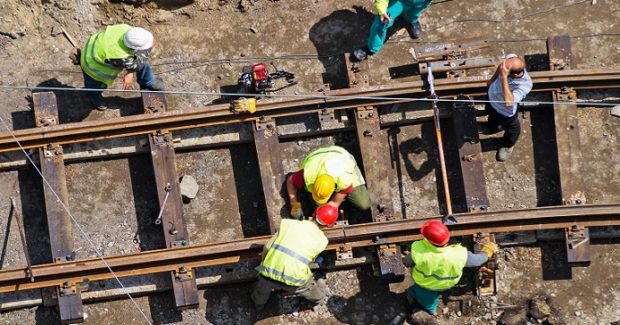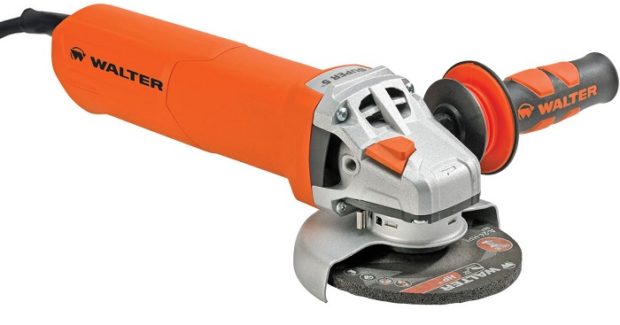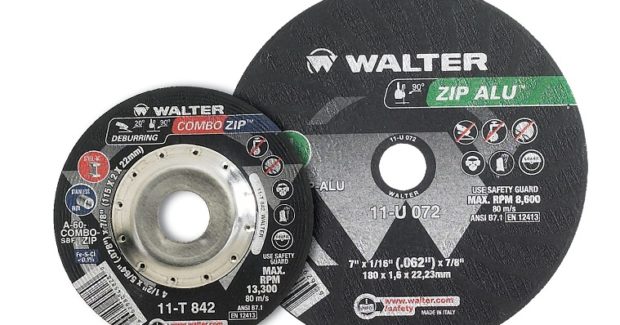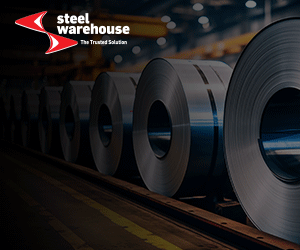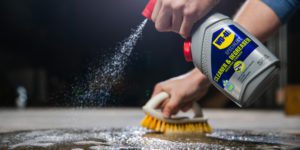All Aboard
After some accidents and trials with less efficient alternatives that caused problems and delayed work, this railway group got on board with replacing their old grinding and cutting devices with new equipment that would eliminate workplace risks without sacrificing productivity.
Posted: April 18, 2019
Moving millions of carloads of freight across North America requires vigilant maintenance of all equipment and rail infrastructure, which takes a staunch commitment to safety. Just ask Peter Shaw, a work equipment specialist at Canadian Pacific Railways (CP Rail; Calgary, AB). This 28-year railway veteran is one of 13,000 CP Rail employees hard at work keeping 51,000 railway cars moving safely across the 13,700 mile rail network of this transcontinental railway group that provides logistics, supply chain and intermodal transportation services in Canada and the U.S. Moving these increasingly high volumes of freight requires constant maintenance of rolling stock, work equipment and sophisticated rail infrastructure. It goes without saying that effective tools and safe work practices are a vital part of the equation. Yet for six months, CP Rail work equipment staffers found themselves deeply challenged after the company implemented an indefinite ban on grinders used to perform cutting and thin-blade tasks.
The safety directive came in the wake of two employee injuries resulting from the use of power tools during maintenance operations. “We had a couple of incidents in the field leading to the ban,” recalls Shaw. A complete review of work methods and tools was necessary and completed by CP Rail, whose technicians need their power tools, especially for high volume sheet metal work, grinding, rail maintenance and scores of other metalworking projects. On any given day, these workers are cutting hoods off locomotives, fitting shields to signaling equipment and dealing with mechanical issues to keep the vast railway up and running. CP Rail shops use grinders and cutting tools every day. Mechanics have them in their trucks and use them for railway breakdowns. In fact, about 70 percent of CP Rail grinders are in daily use.
The company had to replace their legacy grinding and cutting devices with state-of-the-art equipment and safety features for railway workers, and eliminate workplace injury risks using company-wide safety training programs. As the moratorium played out, the company considered their equipment options. While reviewing their safety policy, the rail group turned to less efficient alternatives. A cost-effective solution? “Not at all,” notes Shaw. “And sometimes these alternates were more challenging in use than cut-off wheels. We had complaints from the field. It was causing us all sorts of problems and delaying our work.” Bill Hunter and Daimon Mussell of Walter Surface Technologies (Pointe-Claire, QC) approached CP Rail with a two-pronged solution: better equipment bolstered by a comprehensive safety training program for the machinery and the metalworkers. “They were made aware there were better and safer tools available,” says Mussell. “But our safety training was the tipping point. As we walked them through our products, their features and our safety training program, it made total sense.”
It all began in the CP Rail Calgary shops, where Hunter demonstrated a versatile Combo Zip™ cutting wheel on a hardened steel pin that the company had chosen as a demanding test application. “It cut the pin beautifully,” states Hunter. “Then I flipped the grinder over into a grinding position and deburred the pin. A solution was delivered efficiently, safely and with versatility. The workers were very happy.” Ultimately, CP Rail approved the use of 4.5 in, 5 in and 6 in corded and cordless Walter grinders – each equipped with double action paddle switches to safely stop the devices when not held by users, and gear drive-integrated safety clutches to control torque and eliminate dangerous backlash. After a six-month review and recognizing a need in the field, they also approved the Combo Zip cutting wheels and fast and free-cutting Zip ALU™ wheels for non-ferrous metals.
Shaw recalls being pleased when their engineering executives signed off on this new equipment. At one point, a video showing less effective tools being used by the railway group became instrumental in improving previous processes. By that stage, Shaw says the company realized this was as much a safety as an efficiency issue. “This is what was happening in the field. We had to rethink this,” added Shaw. The new equipment’s performance and safety features were hugely attractive, but training and safety seminars helped tip the scales. “We wanted to stress both the benefits of training and safety features of the tools,” he says. “Our safety training initiative at CP Rail has been an exciting and rewarding challenge,” explains Mussell. “They have crews on the road, on railways and in remote areas. So far we’ve trained over 1,000 of their workers at 80 locations across the country.”
“Our people have fanned out Canada-wide and now into the U.S.,” adds Hunter, who leads safety seminars as early as 5:45 am. Today, the longstanding relationship between the two companies is stronger than ever, boosted by a Walter commitment to rigorous safety equipment handling programs and top-notch customer service. “Their efforts allowed us to reintroduce a line of safe and effective grinding and cutting tools that enabled our shops and crews to return to more productive operations,” states Shaw.
Canadian Pacific Railways, 7550 Ogden Dale Road SE, Calgary, AB T2C 4X9 Canada, 888-333-6370, www.cpr.ca.
Walter Surface Technologies, 5977 Trans-Canada Highway W., Pointe-Claire, QC H9R 1C1 Canada, 514-630-2801, Fax: 514-630-2825, [email protected], www.walter.com.





